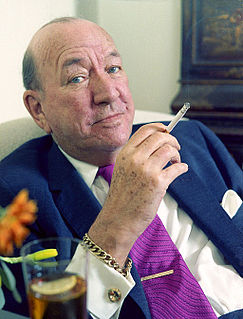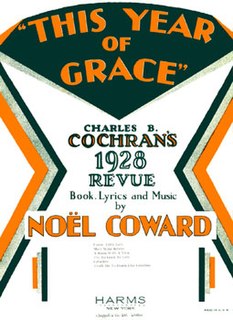
Hay Fever is a comic play written by Noël Coward in 1924 and first produced in 1925 with Marie Tempest as the first Judith Bliss. Best described as a cross between high farce and a comedy of manners, the play is set in an English country house in the 1920s, and deals with the four eccentric members of the Bliss family and their outlandish behaviour when they each invite a guest to spend the weekend. The self-centred behaviour of the hosts finally drives their guests to flee while the Blisses are so engaged in a family row that they do not notice their guests' furtive departure.

Private Lives is a 1930 comedy of manners in three acts by Noël Coward. It concerns a divorced couple who, while honeymooning with their new spouses, discover that they are staying in adjacent rooms at the same hotel. Despite a perpetually stormy relationship, they realise that they still have feelings for each other. Its second act love scene was nearly censored in Britain as too risqué. Coward wrote one of his most popular songs, "Some Day I'll Find You", for the play.

Blithe Spirit is a comic play by Noël Coward. The play concerns the socialite and novelist Charles Condomine, who invites the eccentric medium and clairvoyant, Madame Arcati, to his house to conduct a séance, hoping to gather material for his next book. The scheme backfires when he is haunted by the ghost of his annoying and temperamental first wife, Elvira, after the séance. Elvira makes continual attempts to disrupt Charles's marriage to his second wife, Ruth, who cannot see or hear the ghost.

Present Laughter is a comic play written by Noël Coward. The play's title comes from a song in Shakespeare's Twelfth Night, which urges carpe diem, and so the word present in the title should be pronounced as the adjective, not the verb.

Graham Payn was a South African-born English actor and singer, also known for being the life partner of the playwright Noël Coward. Beginning as a boy soprano, Payn later made a career as a singer and actor in the works of Coward and others. After Coward's death, Payn ran the Coward estate for 22 years.

Sir Charles Blake Cochran, generally known as C. B. Cochran, was an English theatrical manager and impresario. He produced some of the most successful musical revues, musicals and plays of the 1920s and 1930s, becoming associated with Noël Coward and his works.

Cowardy Custard is a musical revue and was one of the last Noël Coward shows staged during his life. It was devised by Gerard Frow, Alan Strachan and Wendy Toye. A book, also titled Cowardy Custard, was published in connection with the revue, similarly celebrating the Coward image.

London Calling! was a musical revue, produced by André Charlot with music and lyrics by Noël Coward, which opened at London's Duke of York's Theatre on 4 September 1923. It is famous for being Noël Coward's first publicly produced musical work and for the use of a 3-D stereoscopic shadowgraph as part of its opening act. The revue's song "Parisian Pierrot", sung by Gertrude Lawrence, was Coward's first big hit and became one of his signature tunes.
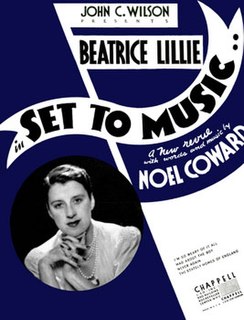
Set to Music is a musical revue with sketches, music and lyrics by Noël Coward.
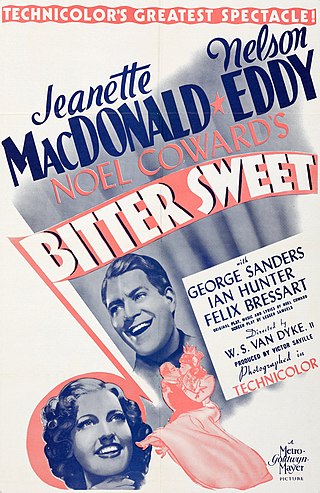
Bitter Sweet is a 1940 American Technicolor musical film directed by W. S. Van Dyke, based on the operetta Bitter Sweet by Noël Coward. It was nominated for two Academy Awards, one for Best Cinematography and the other for Best Art Direction by Cedric Gibbons and John S. Detlie.

The Vortex is a play in three acts by the English writer and actor Noël Coward. The play depicts the sexual vanity of a rich, ageing beauty, her troubled relationship with her adult son, and drug abuse in British society circles after the First World War. The son's cocaine habit is seen by many critics as a metaphor for homosexuality, then taboo in Britain. Despite, or because of, its controversial content for the time, the play was Coward's first great commercial success.
"I Went to a Marvellous Party" is a song with words and music by Noël Coward, written in 1938 and included in the revue, Set to Music. Although a melody exists, the text is most often recited over a piano accompaniment. Out of Noël Coward's approximately 300 songs, this piece is one of his most popular, ranking among the top 30 in royalty potential.

A prolific playwright and successful actor and director, Noël Coward has had a significant impact on culture in the English-speaking world. Time magazine said that he had a unique "sense of personal style, a combination of cheek and chic, pose and poise".
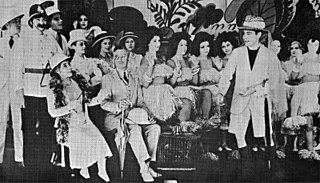
Words and Music is a musical revue with sketches, music, lyrics and direction by Noël Coward. The revue introduced the song "Mad About the Boy", which, according to The Noël Coward Society's website, is Coward's most popular song. The critics praised the show's sharp satire and verbal cleverness.
The Noël Coward Society is an international society founded with the agreement of Coward's literary agent and Estate to celebrate the life and work of Sir Noël Coward.

Noël Coward at Las Vegas is a 1955 live album by Noël Coward.
"Forbidden Fruit", also known as "It's The Peach", is an early Noël Coward song written in 1915, but not publicly performed until 1924 and not published until 1953. Although another early song, "Peter Pan" was the first to be recorded, in 1918, Coward considered "Forbidden Fruit" to be his first full-length song, already exhibiting Coward's trademark "worldly cynicism", risque lyrics, and "love of the internal rhyme." Musical theatre writer Stephen Citron concluded that the song's "musical rhythms, phrase lengths and especially its melodic sophistication are all harbingers of a more mature Coward."

Mad About the Man is a 1958 album by jazz singer Carmen McRae, arranged by Jack Pleis, of songs written by Noël Coward.
